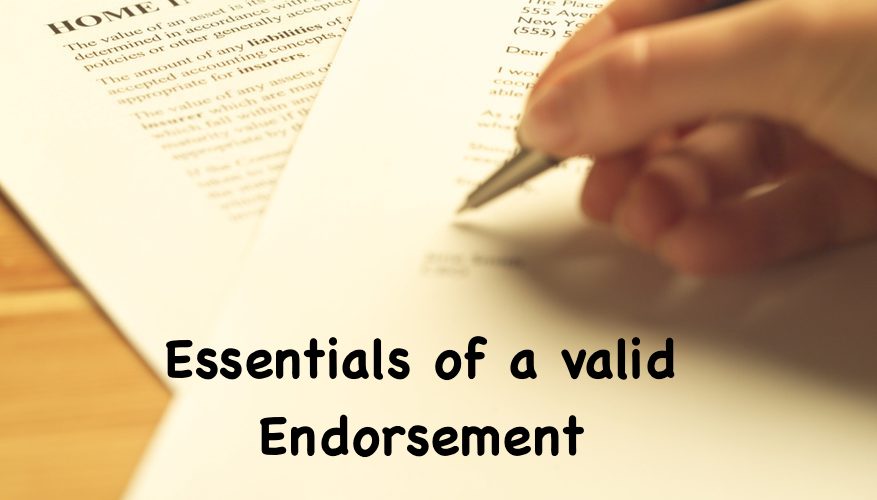The following are the essentials of valid endorsement. An endorsement on a negotiable instrument has the effect of transferring all the rights represented by the instrument to another individual. The ordinary manner in which an individual endorses a cheque is by placing his or her signature on the back of it but it is valid even if the signature is placed somewhere else, such as on a separate paper, known as an allonge which provides a space for a signature. In this chapter, we are going to study the definition, meaning and various types of endorsements.
Essentials of a valid Endorsement
1) Must be on the Instrument: It must be on the instrument. The endorsement may be on the back or face of the instrument and if no space is left on the instrument, it may be made on a separate paper attached to it called allonage. It should usually be in ink.
2) Endorsement by Maker or Holder: It must be made by the maker or holder of the instrument. A tranger cannot endorse it.
3) Signature of Endorser: It must be signed by the endorser. Full name is not essential. Initials may suffice. Thumb-impression should be attested. Signature may be made on any part of the instrument.
4) No Specific Form: It may be made either by the endorser merely signing his name on the instrument (it is a black endorsement) or by any word showing an intention to endorse or transfer the instrument to a specified person (it is a blank endorsement) or by any words showing an intention to endorse or transfer the instrument to a specified person (it is an endorsement in full). No specific form of words is prescribed for an endorsement, but intention to transfer must be present.
5) Delivery: It must be completed by delivery of the instrument. The delivery must be made by the endorser himself or by somebody on his behalf with the intention of passing property therein. Thus where a person endorses an instrument to another and keeps it in his papers where it is found after his death and then delivered to the endorsee, the latter gets no right on the instrument. If delivery is conditional endorsement is not complete until the condition is fulfilled.
6) Endorsement of Entire Bill: It must be an endorsement of the entire bill. A partial endorsement i.e. which supports transferring to the endorsee a part only of the amount payable does not operate as a valid endorsement.







